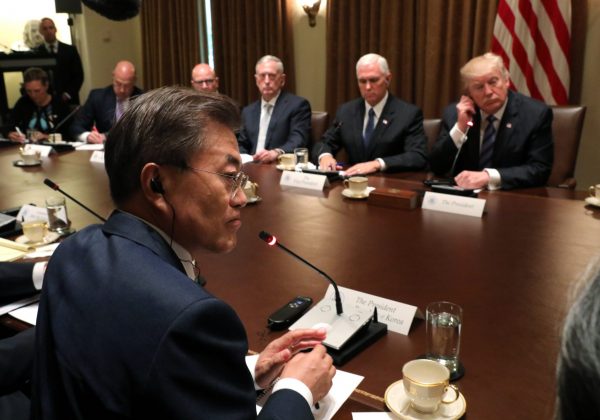The Korean peninsula policy environment is dominated by North Korea. North Korea’s opaque and sensationalist nature sometimes attracts less than able commentators, sometimes with less than practical ideas. Alarmingly, the Korean peninsula policy environment in the era of US President Donald Trump has become even more sensationalised, and in the process polarised between those inclined to diplomatic and military solutions. Amidst this crowded policy environment, South Korea’s voice is easily lost.
President Moon Jae-in’s Liberation Day address on 15 August 2017 was a good example. Leadership addresses, statements, and interviews are essential components in strategic policy communication and normally have substantial influence on partner policy discourse during crises. Yet Moon Jae-in’s address stressing that the United States requires South Korea’s approval for military action on the Korean peninsula — a highly significant statement — was rapidly drowned in a sea of sensationalist articles on North Korea during the same week.
What else could South Korea do to influence US policy discourse on Korean peninsula affairs? Ultimately, the answer is greater innovation and best practice in diplomacy.
First, South Korea could increase direct interaction with the US policy elite. South Korea faced a similar situation in the 1980s when budget and trade deficits turned US public attention to the growing competitiveness of East Asian economies. With Japan already then facing scrutiny for subsidised exports, government–industry collusion and unfair trade barriers, policymakers knew that attention would soon turn to South Korea. The answer was the establishment of the Korea Economic Institute (KEI).
The KEI was established in 1982 as a US ‘non-profit’ institution or ‘think-tank’ in an effort to better inform US policymakers about the South Korean economy. Essentially, it sought to explain domestic economic concerns and challenges to US policymakers and in doing so alleviate public demands for action. Since the 1980s, KEI has evolved to cover a broader mandate beyond economics and trade. It undertakes academic and policy events, university visits and legislative outreach to inform US policymakers on issues such as protests, presidential elections, relations with China and Japan, development and of course, North Korea.
But its strengths are not being fully exploited. Its contribution to South Korea’s national interests could be better recognised by a substantial increase to its budget. It should be rebranded as an institute dedicated to US–South Korea bilateral relations, a timely change to reflect the 70th anniversary of the restoration of the South Korean Embassy in Washington or the 65th anniversary of the US–South Korea alliance in 2018. Finally, KEI should be removed from the administration of the Korea Institute for International Economic Policy, and placed under the direct administration of the Ministry of Foreign Affairs.
Second, South Korea currently does not fully exploit its foreign ministry spokesperson, a role that is used effectively by other countries. An excellent example is the work of Russia’s Foreign Ministry Spokesperson, Maria Zakharova. As a youthful, well-spoken, intelligent and often witty individual, Zakharova counters the negativity and cynicism of Western media representations of Russia President Vladimir Putin and Foreign Minister Sergey Lavrov. Essentially, she has become an easily recognisable and influential third voice supporting Russian foreign policy.
Currently, South Korea’s use of its foreign ministry spokesperson role is limited by tradition, an organisational culture that inhibits individual merit, and the linguistic divide between domestic reporters and foreign correspondents. Strengthening the foreign ministry spokesperson role could ensure South Korea’s views are more consistently represented in foreign media reporting.
Finally, South Korea could encourage its foreign service officers to take on a larger, more public, social media role. Digital public diplomacy can have a direct and highly influential impact on foreign policy elites and foreign publics. Tweeting diplomats can comprise multiple official identities, promoting policy views through trusted networks which allow direct interaction with reporters and policymakers themselves. If carefully managed in recognition of the risks and challenges, digital public diplomacy can vastly enhance more traditional forms of strategic policy communication.
Ensuring the US is aware of and understands South Korea’s policy preferences for handling North Korea is a momentous challenge. But if the Trump administration’s handling of North Korea to date is anything to go by, there has never been a more important and urgent task.
Jeffrey Robertson is Visiting Fellow at the Asia–Pacific College of Diplomacy, The Australian National University and Assistant Professor at Yonsei University.


Thanks for an informative analysis with some useful, concrete suggestions as to how S Korea can try to boost its engagement with and, hopefully, influence over US policy and decision making regarding the unfolding circumstances on the Korean peninsula. While these might be effective, it will take time for them to make a difference. The fluidity of the situation on the Korean peninsula along with resident Trump’s proclivity for unpredictability suggests that more immediate changes are needed.
Trump’s behavior in regards to domestic and foreign affairs has demonstrated that he is influenced to a great degree by whomever he has been in contact with most recently. Thus, it would behove President Moon to be in frequent communication with Trump. In this way he might be able to achieve and sustain Trump’s understanding of S Korea’s wishes in regards to various options being considered.